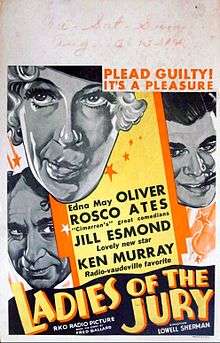Ladies of the Jury
| Ladies of the Jury | |
|---|---|
 Theatrical release poster | |
| Directed by | Lowell Sherman |
| Produced by | William LeBaron |
| Screenplay by |
Marion Dix Edward Salisbury Field Eddie Welch |
| Based on |
Ladies of the Jury by John Frederick Ballard |
| Starring |
Edna May Oliver Jill Esmond Ken Murray Roscoe Ates Kitty Kelly |
| Music by | Max Steiner |
| Cinematography | Jack MacKenzie |
| Edited by | Charles L. Kimball |
Production company | |
| Distributed by | RKO Pictures |
Release date |
|
Running time | 63 minutes |
| Country | United States |
| Language | English |
Ladies of the Jury is a 1932 American pre-Code comedy film directed by Lowell Sherman and written by Marion Dix, Edward Salisbury Field and Eddie Welch. The film stars Edna May Oliver, Jill Esmond, Ken Murray, Roscoe Ates and Kitty Kelly. The film was released on February 5, 1932, by RKO Pictures.[1] It was based on the 1929 play Ladies of the Jury, written by John Frederick Ballard.
Plot
Middle-aged Mrs. Livingston Baldwin Crane (Edna May Oliver) is selected to serve on a jury for the murder trial of French ex-showgirl Yvette Gordon (Jill Esmond), accused of killing her rich, much older husband. The prosecutor calls only two witnesses, a doctor and Mrs. Gordon's maid, Evelyn Snow. Snow testifies that after she found Mrs. Gordon kneeling beside the body of her husband holding the murder weapon, a gun, her employer offered to pay her to say that Mr. Gordon committed suicide. Mrs. Gordon, on the other hand, claims that Snow demanded money to tell the police that story. On the witness stand, Mrs. Gordon says she went away for a week to get away from Mr. Gordon for a while, then returned to an angry, suspicious husband who threatened her with a gun. She states they struggled, and the gun went off by accident. During the testimony, Mrs. Crane asks several questions of the witnesses, much to the annoyance of Judge Henry Fish. She discovers that Snow was recommended to Mrs. Gordon by Chauncey Gordon, Mr. Crane's nephew and sole relative (and heir if Mrs. Gordon is convicted).
When the jury retires to consider a verdict, Mrs. Crane casts the sole "not guilty" vote. When asked why, she replies, "Woman's intuition." After lots of convincing and several votes, the count is ten to two in favor of acquittal. During the deliberations, the wealthy Mrs. Crane manages to (illegally) pass a note to her maid Suzanne, instructing her to hire a detective agency to investigate further.
When Mrs. Crane overhears a couple of the jurors debating whether to switch their votes back to guilty, she recommends they reenact the death at the scene. In the Gordon mansion, Chauncey Gordon refuses to pay Snow any more money until after Mrs. Gordon is found guilty. When they see the jury drive up, Snow hides Chauncey in a secret compartment. However, the jurors find the secret compartment and him by accident. Furthermore, a telegram arrives, stating that the detective agency has found out that Chauncey paid Snow $10,000. As a result, the jury find Mrs. Gordon not guilty.
Cast
- Edna May Oliver as Mrs. Livingston Baldwin Crane
- Jill Esmond as Mrs. Yvette Gordon
- Ken Murray as Spencer B. Dazy
- Roscoe Ates as Andrew MacKaig
- Kitty Kelly as Mayme Mixter
- Cora Witherspoon as Lily Pratt
- Robert McWade as Judge Henry Fish
- Helene Millard as Miss Evelyn Elaine Snow
- Kate Price as Mrs. McGuire
- Guinn "Big Boy" Williams as Steve Bromm (uncredited)
Reception
The New York Times review was favorable. The critic praised Edna May Oliver's "most amusing performance" and stated that "she is a clever enough player to deserve even a better story. But this film has a number of really funny lines and creditable portrayals are given by those in the supporting cast".[2]
TV Guide called it an "innocuous courtroom drama" and noted that "Oliver is hilarious".[3]
Remake
It was remade as We're on the Jury in 1937.
See also
- 12 Angry Men, a 1957 film about a similar jury deliberation, starring Henry Fonda
References
- ↑ "Ladies of the Jury (1932) - Overview". Turner Classic Movies. Retrieved September 9, 2014.
- ↑ M. H. (April 2, 1932). "Movie Review - A Triumphant Woman". The New York Times. Retrieved September 9, 2014.
- ↑ "Ladies Of The Jury Trailer, Reviews and Schedule for Ladies Of The Jury". TV Guide. Retrieved September 9, 2014.